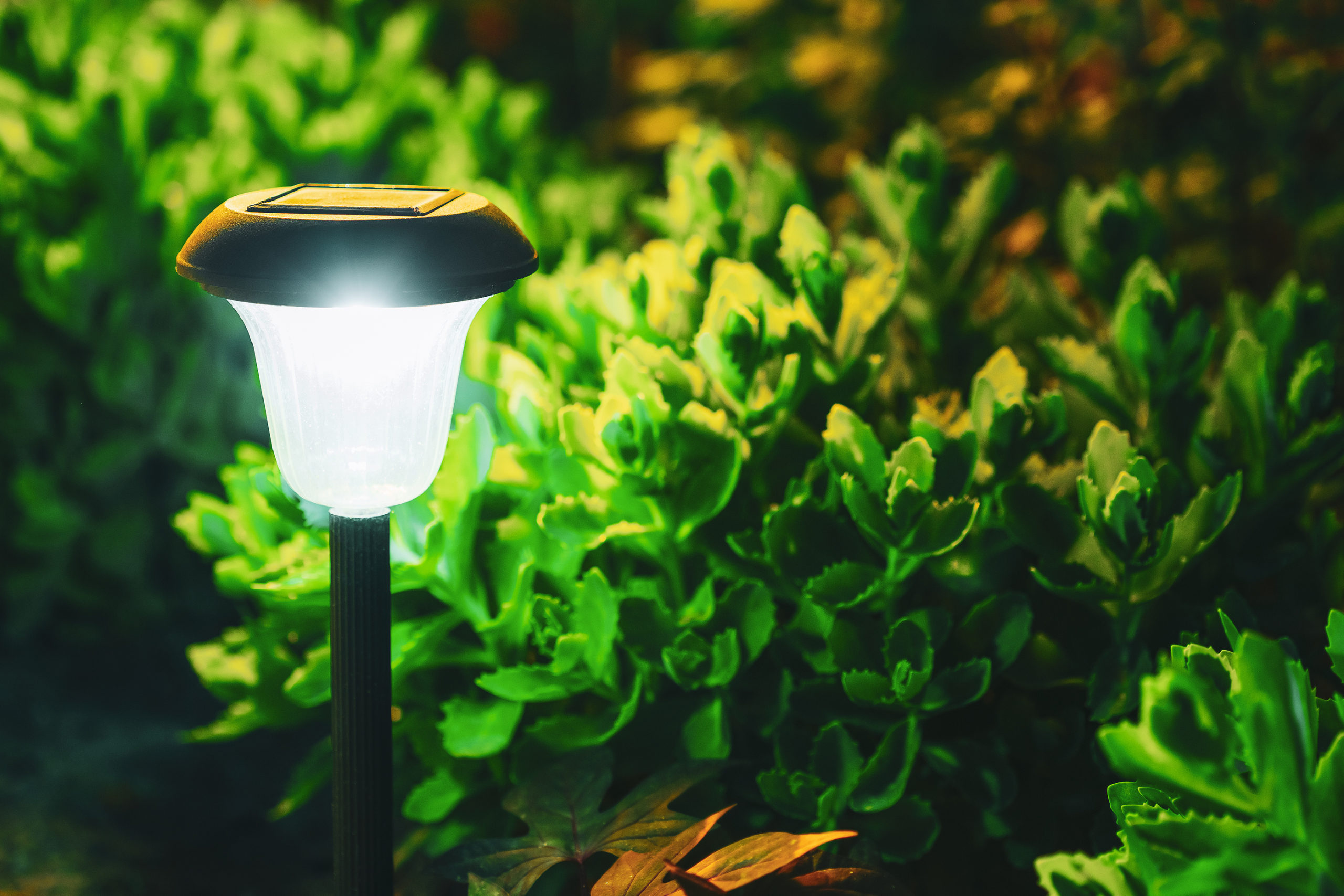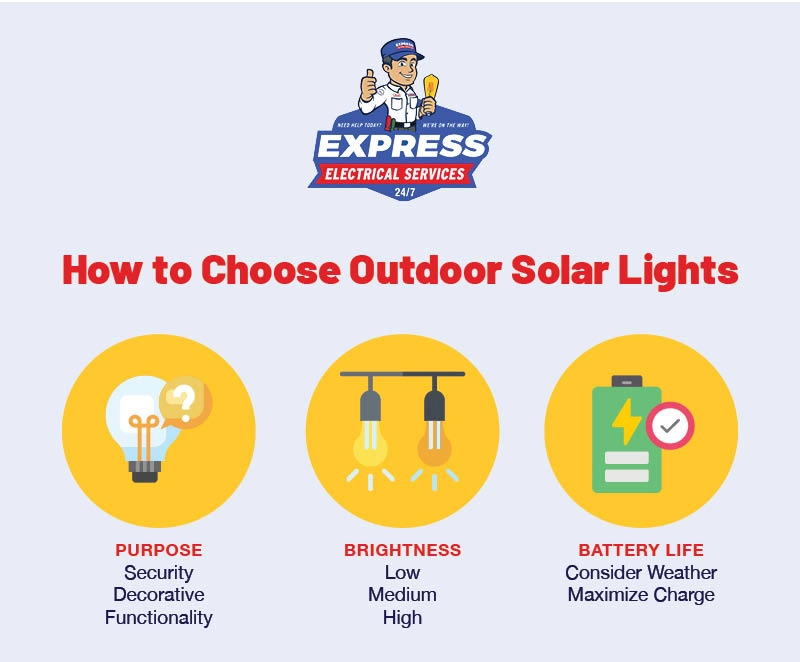How to Choose Outdoor Solar Lights

While all outdoor solar lights can add style and illumination to your home by harnessing the power of the sun, there are a few options to consider when choosing the right lights for your home. At Express Electrical, our team of licensed electricians can help — see this solar light buying guide to learn more.
Why Choose Outdoor Solar Lights?
Powered by similar technology as large-scale solar power systems, outdoor solar lights are a great alternative to conventional lighting for illuminating outdoor dining areas, driveways, paths, landscaping, and other spaces. With advances in solar technology, everyday solar lighting solutions are increasingly accessible and affordable options that provide several advantages. These include:
- Energy conservation: Solar lights don’t use the grid for power and don’t incur ongoing electricity costs, translating to reduced energy consumption and utility bills for your home.
- Ease of installation: Without the need to connect to the grid through outdoor outlets, configurations for solar lights are typically straightforward and convenient.
- Versatility: Solar lights come in various types and styles, allowing for versatile aesthetic and functional applications for your outdoor space.
- Safety: Outdoor solar lighting helps to illuminate hazards around your property at night and can deter intruders, enhancing the safety of your home.
- Environmental impact: Since they rely on renewable solar power, operating these lights doesn’t contribute to fossil fuel pollution and can reduce your carbon footprint.
How Do Solar Lights Work?
Solar lights use photovoltaic (PV) cells, also called solar cells, to absorb energy from the sun and generate an electrical charge. When exposed to light, the semiconductor materials in the PV cells absorb the energy and transfer it to electrons in the material, which then use the extra energy to flow through the material as an electrical current. Conductive metal contacts in the solar cells extract the current to your battery.
The battery stores energy until it’s needed to power the light. Most solar lights have sensors to detect light levels, which prompt them to either draw from the battery and turn the LEDs on at low light or to turn off and recharge during daylight. These devices charge best when exposed to direct sunlight, but high-quality models can still charge and illuminate outdoor areas during shorter daylight hours and overcast days.
Factors to Consider When Choosing Outdoor Solar Lights
There are a range of factors to consider when choosing the right outdoor solar lights for your home or business.
Purpose
Consider how you plan to use solar lights, such as for security, safety, decoration, functionality, or a mix of purposes as they can influence your design and functional choices. For example, solar floodlights, spotlights, and driveway lights primarily offer safety and security as they brighten large areas to help with navigation or to deter pests and other intruders.
Pathway, pool, and other lights similarly provide safety, but they can also offer aesthetic appeal with strategic planning. Likewise, patio lights provide task lighting for your outdoor gathering spaces to improve function, but different styles or features can also elevate the ambience and aesthetic appeal of the area.
Here are some of the most popular outdoor solar lighting options to choose from:
- Pathway lights: A popular option, solar pathway lights come in a range of styles, hues, and battery life. Perfect for walkways, along stairs, on walls, or around the edges of your driveway, solar path lights are available at accessible prices. These lights often come with mounting brackets or ground stakes so you can easily move them around to get the perfect positioning.
- Accent lights: Available in a variety of hues, lighting effects, and designs, accent lighting typically is a great opportunity to add ambience and get creative with your outdoor space. Common styles include solar string lights, decorative lanterns, garden lights, and floating pond or pool lights. You can even opt for outdoor ceiling fans with integrated lighting for your covered spaces.
- Security lights: Floodlights, spotlights, and other types of solar lights can boost your security with bright illumination. These lights often feature timers and motion sensors to detect your movement for safe navigation or to deter intruders. Many can also integrate with smart home security systems.
Brightness
Solar light brightness is best measured in lumens. The higher the lumens of a solar light, the brighter its light output. Fewer lumens likewise translates to a relatively dimmer light.
The purpose and type of light may help determine the ideal lumens — patio lights, for example, are meant for a mix of ambience and function and likely don’t need to be as bright as driveway floodlights. If you don’t want to compromise on brightness, amber or other warm-hued lights can run at high lumens but produce a softer and more ambient glow.
See these general lumens guidelines for outdoor lighting:
- Landscape: 50-300 lumens
- Path lights: 100-200 lumens
- Wall lights: 50-185 lumens
- Spotlights: 120 lumens
- Pool/pond lights: 200-400 lumens
- Floodlights: 700-1300 lumens
Battery life and capacity
The quality and capacity of the rechargeable battery influence the running time of your solar lights. Consider your area’s weather — while Los Angeles and Orange County residents don’t generally lack sunny weather, areas prone to overcast or high precipitation may benefit from batteries with larger capacity. Even with California’s typically sunny weather, seasonal smoke cover from wildfires can block out the sun, but high-capacity batteries allow you to still rely on solar lighting.
Get the most from your charging efficiency by choosing strategic places and high-quality solar panels. If you have a shaded yard or live in cloudy regions, you can optimize your charging by upgrading to remote photovoltaic panels on your roof.

Installation and Maintenance Tips
Proper solar light installation and maintenance can enhance the performance and lifespan of your outdoor lights:
- Optimize placement: Place solar panels where they can receive the maximum of direct sunlight available in a day. Adjust the solar panels seasonally to accommodate for the sun’s changing angle throughout the year.
- Remove obstructions: Remove overgrown plants or other obstructions that block solar panels from direct sun.
- Clean panels: Keep solar panels clean from dirt, dust, and other debris to maximize efficiency.
- Maintain batteries: Periodically inspect batteries for corrosion or wiring for fraying or other damage, replacing or repairing components as needed.
Contact a Licensed Electrician for Outdoor Solar Lighting Installation
From bright solar spotlights to decorative solar garden lights, Express Electrical Services and our team of licensed electricians champion businesses and homeowners who want eco-friendly electrical system upgrades. We offer superior Los Angeles solar lighting services as well as traditional outdoor lighting installation that can help you save electricity and add value to your home. Contact us or book online today.
Frequently Asked Questions
Do I need waterproof solar lights?
Waterproofing is essential for solar lights. Since they’re exposed to the elements, most outdoor solar lights feature waterproof seals and materials to prevent damage to sensitive components.
How long do solar light batteries typically last?
The lifespan of a solar light battery depends on quality, usage, environmental conditions, and maintenance, but they can typically last between 1 and 5 years with proper care.
